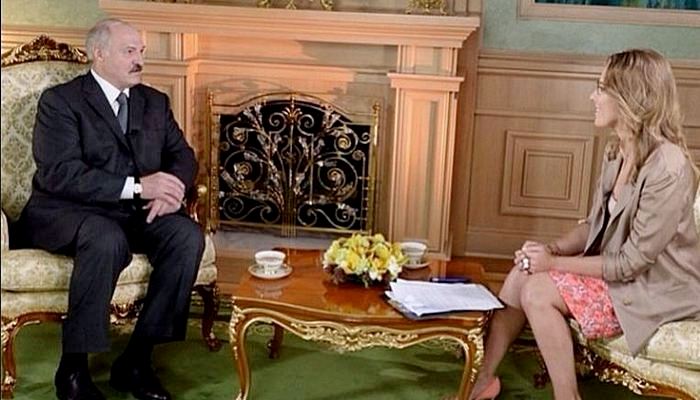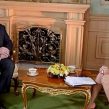
Belarus: Leaning to Russia While Trying to Retain a Niche of Its Own
Publication: Eurasia Daily Monitor Volume: 11 Issue: 99
By:

President Alyaksander Lukashenka gave an interview to Ksenia Sobchak, a talk show host from the beleaguered Russian TV channel Dozhd (Rain), a mouthpiece of liberal Westernizers. Using the occasion, Lukashenka vented about his disagreements with Russia. For example, he averred that “from a legal perspective, the [May 11] referenda in Donetsk and Luhansk oblasts [on the regions’ sovereignty from Ukraine] are meaningless… Any referendum ought to be conducted on the basis of the constitution.” He conceded that Russian President Vladimir Putin is on target when he says that Kyiv ought to negotiate directly with the proponents of Ukraine’s federalization, but he also opined that “nobody wants Putin to be part of those negotiations, and nobody wants him in Ukraine” (https://russian.rt.com/inotv/2014-05-22/Lukashenko-Putina-na-Ukraine-nikto).
Moreover, Lukashenka asserted that Russia does not need to annex more land as it has problems with taking care of the land it already owns. The Belarusian president even praised former president Mikheil Saakashvili of Georgia, Russia’s sworn enemy. “In the West, nobody fought on our behalf as much as Saakashvili… He was on first name basis with [American leaders]; he used to say to the Vice President of the United States [Joe Biden] that you [Washington] treat Belarus wrongly, there should be no sanctions against it; it is a normal country with a normal president.” Lukashenka acknowledged that he could not accept Saakashvili’s invitations to pay a visit to Georgia, “because Russia’s leadership would not perceive this in stride” (https://naviny.by/rubrics/politic/2014/05/21/ic_articles_112_185570/).
On the subject of the Belarusian political opposition, Lukashenka repeated his earlier opinion about its worthlessness. According to Lukashenka, the West has also recognized this and is now bestowing less money on the opposition, although a certain amount of cash has just been delivered in conjunction with the ice hockey championship. “I am turning a blind eye to this and I am telling my secret police: ‘Do not worry; some of them [members of the opposition] bought a car, others buy gasoline at our gas stations, and somebody built a house.’ Pray to God that we are relieved from paying them the way it is done in your country [i.e., in in Russia] when you lure certain members of your so-called opposition,” Lukashenka told Sobchak, his interviewer (https://naviny.by/rubrics/politic/2014/05/21/ic_articles_112_185570/).
He recognized that Belarus still lacks a unifying “national idea” and that “this is a very serious issue.” Sobchak tried her best to contrast Putin’s divorce with Lukashenka having retained his marriage to his estranged wife Galina. To that, Lukashenka replied that he does not want to traumatize his wife, who is a decent person. As for Putin, Lukashenka opined that his divorce resulted from pressure by a rival female partner, a kind of pressure nobody exerts on Lukashenka, including Darya Shmanai, a winner of a 2013 beauty pageant, who has been seen next to Lukashenka on many occasions. Lukashenka claimed that he is not nurturing a successor but would be happy if a new leader emerged, who would not let the country down. He said he would resign either if he falls ill or if he loses the election. And he also confessed that he wants to be buried in his native rural village (https://naviny.by/rubrics/politic/2014/05/21/ic_articles_112_185570/).
Those of Lukashenka’s statements that reveal the scope of his disagreements with Russia need to be perceived against the backdrop of tightening bonds with that country in conjunction with the official ceremony of endorsing the Eurasian Economic Union of Russia, Belarus and Kazakhstan on May 29. This event, and its potential implications, have intensified the debate about Belarus’s sovereignty and its separate-from-Russia identity.
Writing for Belorusskie Novosti (May 25), an outlet for the moderate opposition, Anton Shreibman, notes that Belarus’s secret police has put the Belarusian Slavic Committee (BSC) under “unprecedented pressure.” While it is unclear what this pressure amounts to, the announcement to this effect is referred to by Sergei Kostyan, a member of Belarus’s House of Representative and the leader of the BSC. It is difficult to find a member of the Belarusian political class more avowedly loyal to Lukashenka than Kostyan; but the BSC’s pan-Slavic ideology may now be perceived as a risk. The BSC believes that Russians, Ukrainians and Belarusians are essentially one people whose national home should be a single country. However, “in Belarus, nobody is allowed to play on the Russian field. This is the exceptional ideological monopoly of Lukashenka, and those breaking this monopoly are to be punished more severely than pro-Western politicians,” Shreibman argues (https://naviny.by/rubrics/politic/2014/05/25/ic_articles_112_185609/).
The issue is becoming all the more topical since Russia, motivated by its geopolitical defeats and the example of the West, considers using more soft power abroad than ever before. No fewer than 20 ideological entities exist in Belarus that use funding from Russia. Of particular importance are the Belarusian branch of the Russian analytic portal Regnum (belarus.regnum.ru) and the Imperia Project (Imperia.by), which have already castigated modest expressions of Belarusian nationalism, like attention to the Belarusian language and replacing the Ribbons of Saint George by green-red ribbons reflecting the colors of the Belarusian flag (see EDM, May 14).
Although the law on foreign aid for Belarusian non-governmental organizations classifies such funding as evidence of meddling into the sovereign affairs of the country, a 2003 amendment to this legislations exempts Russia’s aid from such qualification. In other words, any aid from Russia is legal in Belarus. This, according to Shreibman, effectively makes the recipients of that aid the “sixth column”—a play on the “fifth column” label that Lukashenka has long affixed to Belarus’s pro-Western opposition. Shreibman believes that the “sixth column” is going to be under more intense surveillance than the traditional opposition (https://naviny.by/rubrics/politic/2014/05/25/ic_articles_112_185609/).
Belarus’s economic relationship with Russia has also come under stronger critique recently. In particular, the participants of the Tallinn-based conference “The Ukrainian challenge and regional cooperation between West and East in the Belarusian context” (May 21–22) were largely united in their opinion that formalizing the regional integration project with Russia props up Belarus’s standard of living in the short run, but in the long run it serves to retain a backward structure of the economy (https://naviny.by/rubrics/politic/2014/05/26/ic_articles_112_185619/).
Ironically, it may well be that this opinion is tacitly shared by many in the corridors of power in Minsk; and if that is the case, the opportunity for a long hoped-for thaw between Belarus and the West is currently more real than ever.




